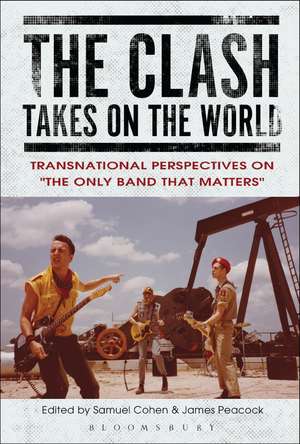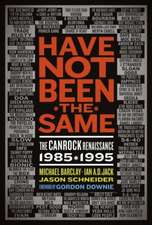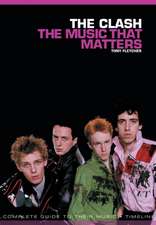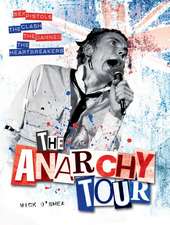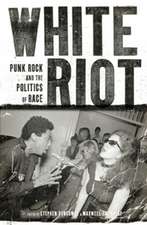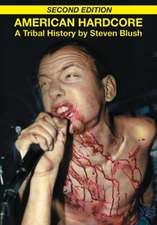The Clash Takes on the World: Transnational Perspectives on The Only Band that Matters
Editat de Samuel Cohen, Dr James Peacocken Limba Engleză Paperback – 26 dec 2018
| Toate formatele și edițiile | Preț | Express |
|---|---|---|
| Paperback (1) | 231.51 lei 6-8 săpt. | |
| Bloomsbury Publishing – 26 dec 2018 | 231.51 lei 6-8 săpt. | |
| Hardback (1) | 833.88 lei 6-8 săpt. | |
| Bloomsbury Publishing – 31 mai 2017 | 833.88 lei 6-8 săpt. |
Preț: 231.51 lei
Preț vechi: 297.45 lei
-22% Nou
Puncte Express: 347
Preț estimativ în valută:
44.31€ • 46.08$ • 36.58£
44.31€ • 46.08$ • 36.58£
Carte tipărită la comandă
Livrare economică 15-29 aprilie
Preluare comenzi: 021 569.72.76
Specificații
ISBN-13: 9781501348099
ISBN-10: 1501348094
Pagini: 288
Dimensiuni: 152 x 229 x 14 mm
Greutate: 0.38 kg
Editura: Bloomsbury Publishing
Colecția Bloomsbury Academic
Locul publicării:New York, United States
ISBN-10: 1501348094
Pagini: 288
Dimensiuni: 152 x 229 x 14 mm
Greutate: 0.38 kg
Editura: Bloomsbury Publishing
Colecția Bloomsbury Academic
Locul publicării:New York, United States
Caracteristici
A properly multidisciplinary perspective on the subject which brings the study of popular music and politics together
Notă biografică
Samuel Cohen is Associate Professor of English at the University of Missouri, Columbia, USA.James Peacock is Senior Lecturer in English and American Literatures at Keele University, UK.
Cuprins
Foreword by Don Letts1. Introduction: The Transnational ClashSamuel Cohen (University of Missouri, USA) and James Peacock (Keele University, UK)2. An Analysis of The Clash in Concert: 1977-1982Peter Smith (University of Sunderland, UK)3. Politics, Pastiche, Parody, and Polemics: The DIY Educational Inspiration of The Clash Andy Zieleniec (Keele University, UK)4. Turning Rebellion into Money: The Roots of The Clash Isaac Vayo (University of Minnesota-Twin Cities, USA)5. The Clash Sell Out: Negotiating Space in the Ideological SuperstructureNathalie Prévot and Graham Sinclair6. The Clash: Sociological Imagination and Critical PhilosophyDiana Cedeno7. Righteous Minstrels: The Clash, Race, and the Rock WriterJack Hamilton (University of Virginia, USA)8. Washington Bullets: The Clash and VietnamSamuel Cohen (University of Missouri, USA)9. Spouting Slogans for the Sandinistas? The Clash and International SolidarityJeremy Tranmer (University of Lorraine, France)10. Punk Politics, Blackness, and Indigenous Protest: The Clash's Australian Tour, 1982Gabriel Solis (University of Illinois, Urbana-Champagn, USA)11. From a Long Way Away: New York and London in The Clash's "Red Angel Dragnet"James Peacock (Keele University, UK)12. The Last Gang in Town: The Clash Portrayed in New York and ParisJustin Wadlow (Université de Picardie Jules Verne, France)13. Mick Went Disco and Joe Sang Campfire Songs: Punk Afterparties and the Politics of Forking PathsMichael J. Salvo (Purdue University, USA)14. Conclusion: The Only Band that MattersSamuel Cohen (University of Missouri, USA) and James Peacock (Keele University, UK)
Recenzii
A world of "takes" on The Clash awaits the reader of The Clash Takes on the World. Not satisfied with the the facile dismissal of The Clash's real political commitments that permeates so much of the criticism, these writers take seriously the band's engagement on the transnational stage, and do so from an impressive array of disciplinary positions. The best of the essays combine meticulous close analysis with ambitious theoretical bravado to produce a collection both admirably deep and dazzlingly wide. What's more, The Clash is always a band in these analyses, not merely odd jobbers propping up charismatic frontman Joe Strummer. The Clash Takes on the World remaps our understanding of "the only band that matters" in productive, exciting, and often surprising ways. An American reader, at least, must put down the volume in a mood of real desperation: "Where are they now when we need them most?"
At a time when British popular music might be regarded as inward-looking, even parochial, The Clash Takes on the World reminds us of a band and a time when UK rock moved confidently beyond the confines of these islands, transmitted a transatlantic imperative, and spread its vision across several continents. The shock troops of London's punk scene, the Clash quickly became more than that, their ideological impetus embracing the International left with vigour, energy and wit. Post-colonial, anti-imperial, pro- underdog, Strummer, Jones and co. absorbed sounds and styles from the US, the Caribbean, South America and further afield. Transnational in scope and cross-disciplinary in voice, Peacock and Cohen's book reminds us that punk may have had local beginnings, but the Clash gave it global purpose. This essay collection, penned by an international cast of academics, embraces issues of culture, ideology, class and race, and considers the band's reputation in the great cities of London, New York and Paris. It utilises various prisms to read the band and its activities - war and reggae, journalism and art, for example - and unwraps the group legend from a number of key positions: as a live act, as touring posse, as DIY practitioners and studio operatives. The Clash have long been mythologised as the authentic standard bearers of that mid-1970s musical revolution. This book analyses multiple aspects of that mythology to provide an insightful and rounded deconstruction of the meanings behind this punk phenomenon.
More than any other band The Clash felt the spirit - positive or negative - of the planet's unconscious. Through the magic of their lyrical and musical poetry the four musicians conveyed this wherever they were heard or seen. Without losing their balance they existed in the gap between art and life. The Clash really were The Only Band That Mattered. Samuel Cohen and James Peacock comprehensively explore these esoteric qualities with depth and understanding.
At a time when British popular music might be regarded as inward-looking, even parochial, The Clash Takes on the World reminds us of a band and a time when UK rock moved confidently beyond the confines of these islands, transmitted a transatlantic imperative, and spread its vision across several continents. The shock troops of London's punk scene, the Clash quickly became more than that, their ideological impetus embracing the International left with vigour, energy and wit. Post-colonial, anti-imperial, pro- underdog, Strummer, Jones and co. absorbed sounds and styles from the US, the Caribbean, South America and further afield. Transnational in scope and cross-disciplinary in voice, Peacock and Cohen's book reminds us that punk may have had local beginnings, but the Clash gave it global purpose. This essay collection, penned by an international cast of academics, embraces issues of culture, ideology, class and race, and considers the band's reputation in the great cities of London, New York and Paris. It utilises various prisms to read the band and its activities - war and reggae, journalism and art, for example - and unwraps the group legend from a number of key positions: as a live act, as touring posse, as DIY practitioners and studio operatives. The Clash have long been mythologised as the authentic standard bearers of that mid-1970s musical revolution. This book analyses multiple aspects of that mythology to provide an insightful and rounded deconstruction of the meanings behind this punk phenomenon.
More than any other band The Clash felt the spirit - positive or negative - of the planet's unconscious. Through the magic of their lyrical and musical poetry the four musicians conveyed this wherever they were heard or seen. Without losing their balance they existed in the gap between art and life. The Clash really were The Only Band That Mattered. Samuel Cohen and James Peacock comprehensively explore these esoteric qualities with depth and understanding.
